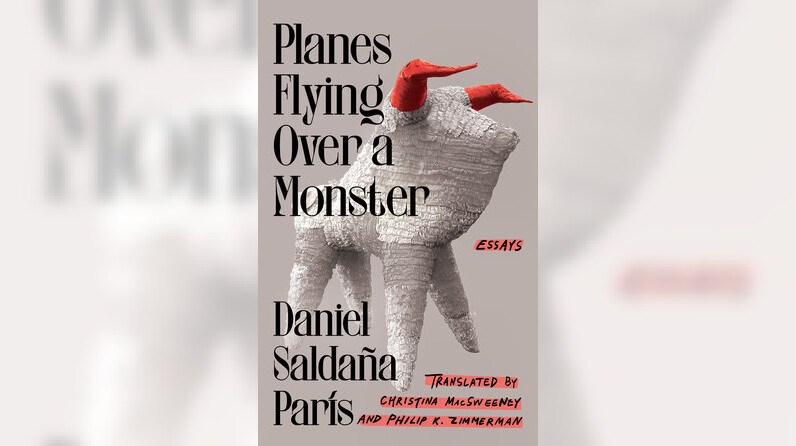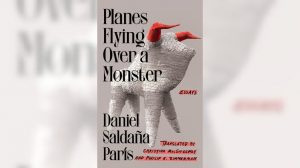
Can travel transform your life? This author says yes
Mexico City-based writer Daniel Saldaña París has been called “the Mexican Philip Roth” — no doubt not only for his candid and gritty renderings of life, but also for the moving insights found in his writing.
He has published two novels, “Strange Victims” and “Ramifications,” but coming out Aug. 20 from Catapult is the English language translation of his first essay collection, “Planes Flying Over a Monster.” Through 10 personal essays, Saldaña París takes readers through Havana, Montreal, Madrid and other cities, reflecting not only on the character of each place but also on the memories we form and how writing and reading in the process can transform our understanding of ourselves and the world around us. He talked to SCNG Premium through an email correspondence about his reflections on travel:
Do different places allow us to discover, or rediscover, parts of ourselves that would remain dormant if we stayed in familiar locales?
Yes, absolutely. Visiting a new city, a new culture, opens up a whole new set of possibilities for oneself. There’s an alertness in traveling that sharpens the senses, forcing us to pay attention to details that we would otherwise overlook. Even if we carry our own memories, our personal history, the novelty of a different city creates a break in the routine.
Cities across the world of course all have their different characters, but what for you makes a city great, someplace worth returning to?
I like to think of cities as palimpsests: layers upon layers of history, individual stories, and meanings assigned by the fictional representations of that city (movies, books) as well as by its inhabitants. For me, a great city is one in which all those layers are more or less legible or apparent to an attentive visitor. A city that, instead of imposing a monolithic image of itself, invites you to create a personal relationship with it. Thus, a great city, to me, doesn’t hide its contradictions, no matter how uncomfortable these may be.
What is a hack you have learned for navigating a strange place?
Even if I’m in a place for only a few days, I like finding a place to return to — a café, a park, an intersection. Humans also find meaning in repetition, and sometimes it’s worth going back a few times to the same space to create a meaningful relationship with it instead of running around trying to see as much as possible. I also practice walking a block or two at an unusually slow speed, paying attention to the signs offered by the city: its stores, graffiti, architecture and even its trash. I love getting a sense of a place by overhearing conversations and writing them down in my notebook.
“If, as Plato believed, knowing is remembering, then I’ve been remembering Cuba forever…” you write in a memorable essay on visiting Havana. That city is central to your own origin story, and yet you’d never been there, at least as an adult. Is it fair to say that the places we traveled to become part of our personal mythology?
More ‘Ticket to Paradise’
This story is part of a collection of stories printed in July 2024.
Yaamava’ Resort & Casino is the best way to Vegas without going to Las Vegas
Journeys by a father and son inspire Healdsburg’s Aperture Cellars
How caring for a sick dog changed our view on traveling
Don’t let physical limitations limit your travel. Here’s advice on planning an accessible adventure
Read more ‘Ticket to Paradise’
More SCNG Premium content
Some of them do, and sometimes it’s hard to say why. I spent 10 days in Port of Spain, Trinidad, some 15 years ago, and I still think of that trip as a defining one for no particular reason. I also think that literature enhances the experience of visiting a place: if you have read books by local authors, you perceive a different, deeper reality, more nuanced. I will always choose literature in translation over tourism.
What are some travel writings that have influenced your own, and that you think any traveler must know?
I love the diaries of filmmaker Jonas Mekas, his sense of place and intimacy. I love the journalistic work of Jon Lee Anderson, the way he can talk to anybody and get something important out of the conversation. I also recommend the travel writings of Belgian explorer Alexandra David-Néel. “Stranger on a Train,” by Jenny Diski, is another favorite of mine.
Do we have to leave home to fall in love with it again?
I often have the feeling that there is no such thing as returning: the person that leaves is never exactly the same as the one that comes back, and the place we come back to has often changed as well. Yet, the distance allows us to look at our home with fresh eyes, to rediscover details of it that we take for granted. We find the exotic in the domestic and vice versa. Love can definitely grow out of that estrangement.


